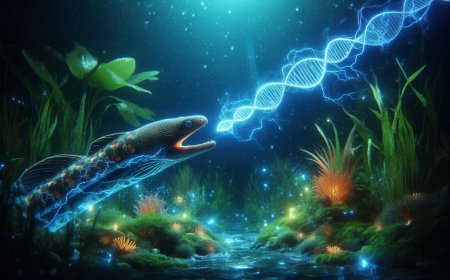The Octopus Brain Can Rewrite Its Own RNA in Response to Temperature Changes: A Genetic Superpower Beyond Mammals
Discover how octopuses adapt to temperature changes by rewriting their own RNA—an extraordinary ability not found in mammals. Learn how this genetic superpower keeps their brains sharp in cold water.

Octopuses have long fascinated scientists and ocean lovers alike with their shape-shifting bodies, color-changing skin, and almost alien intelligence. But as research continues to unravel their secrets, one discovery stands out as particularly mind-blowing: the octopus brain can rewrite its own RNA to adapt to environmental changes—specifically, changes in temperature. This molecular flexibility is something that mammals, including humans, can't do. It’s as if octopuses have a built-in wardrobe of genetic outfits and can change them depending on the weather.
What Does "Rewriting RNA" Mean?
Let’s start with the basics. In most animals, including humans, genetic information flows in one direction:
DNA ➝ RNA ➝ Protein.
DNA contains the permanent genetic blueprint. RNA is like a messenger that carries instructions from DNA to make proteins, the molecules that perform most of the work in cells.
Typically, once RNA is copied from DNA, it's considered final and unchangeable. But not for octopuses.
Octopuses (and their relatives like squids and cuttlefish) can edit their RNA after it's made, a process called RNA editing. This allows them to alter the instructions before making proteins—essentially changing how their bodies respond without altering their underlying DNA.
Adapting to Cold Waters
Recent studies have shown that octopuses use this RNA editing ability to adjust how their neurons work in different temperatures. For instance, when the water gets colder, the activity of nerve cells (neurons) slows down. But instead of being sluggish, octopuses rewrite their RNA to make proteins that help their neurons function more effectively in the cold.
In one experiment, researchers exposed octopuses to different water temperatures and found that hundreds of RNA sites were edited differently depending on the temperature. These changes mainly occurred in neural tissues, directly affecting how their brains and nervous systems worked. The edits helped maintain proper nerve signal transmission, despite the cold.
It’s like the octopus is saying, “Oh, it’s colder today? Let me swap out this part of my neural wiring so I don’t freeze up.”
How Is This Different From Mammals?
Mammals, including humans, also have RNA editing abilities—but to a far lesser extent. We edit only a handful of RNA sites, and usually not in response to environmental conditions. In contrast, octopuses edit over 60% of their RNA transcripts in the brain, making them the undisputed champions of RNA editing.
Moreover, mammals typically adapt to temperature changes through longer-term processes like gene expression regulation, hormonal changes, or behaviors (e.g., seeking warmth). But octopuses have a real-time molecular toolkit, allowing them to fine-tune protein function on the fly.
A Flexible Brain for a Flexible Creature
Why do octopuses need such a remarkable ability? One reason is their complex nervous system. An octopus has about 500 million neurons—more than some mammals—and most of them are located in their arms. To survive and thrive in their ever-changing ocean environments, especially without a protective shell or skeleton, octopuses need to remain agile, responsive, and mentally sharp.
RNA editing allows their nervous system to adapt rapidly and precisely to external conditions, like changes in water temperature. This might explain how they remain intelligent and agile even in chilly waters where other creatures slow down.
What Does This Mean for Science?
Understanding how octopuses use RNA editing could have far-reaching implications. Scientists are exploring how similar mechanisms might be harnessed in medicine, neurobiology, and even synthetic biology. If we could learn to control or mimic this process, it might open doors to treating diseases, improving brain function, or building adaptable AI systems inspired by nature.
Final Thoughts: Nature’s Genetic Fashionistas
The ability of octopuses to rewrite their own RNA is nothing short of astonishing. Imagine being able to change the way your brain works just by tweaking your internal coding—no evolution required, no generational wait. Just a quick genetic "outfit change" to stay comfortable and functional.
In a world where adaptability often means survival, octopuses remind us that nature still holds secrets far beyond our current understanding. Their RNA-editing superpower places them among the most genetically versatile and intellectually mysterious creatures on Earth.
What's Your Reaction?







































































































